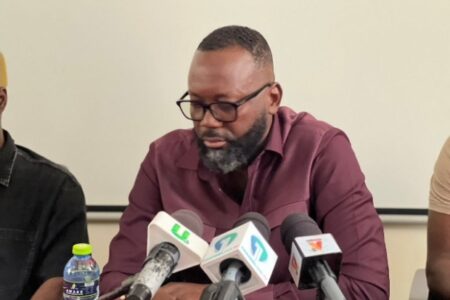With Organized Labour’s ultimatum to the government to address the growing threats of galamsey on the environment, Small-Scale miners are pushing back against calls for an outright ban on their activities.
Instead, they are advocating for a roundtable dialogue to find a lasting solution to Ghana’s environmental degradation challenges.
“A total ban is a recipe for chaos. Where will these small-scale miners find their daily bread? Daniel Nyame, Eastern Regional Coordinator for Small-Scale Miners asked in an interview with the paper on Friday, September 27, 2024.
He underscored the sector’s significant contribution to Ghana’s economy, citing the potential decline of the Cedi’s value without decline.
The Chief Executive of the Ghana Chamber of Mines, Suleman Koney, corroborated this claim in an interview.
According to Koney, the Cedi would have been GHS25 to US$1 by now if not for mining.
The Small-Scale Mining sector directly employs over 1 million Ghanaians and supports an additional 5 million people, according to a 2016 UNEP report. In contrast, the large-scale mining sector employs 8,760 people and 25,603 contractors, as reported by the 2020 GHEITI report.
The General Secretary of the Ghana National Small-Scale Miners Association, Godwin Armah, in an exclusive interview echoed Daniel Nyame’s sentiments.
“Fighting galamsey with the military is not sustainable. We need a holistic and multifaceted approach to end the menace”, noted Armah, citing measures implemented by successive governments, including military intervention and bans, as ineffective.
“Clamping down on galamseyers is a very difficult fight. To opt for a complete ban on small-scale mining is not and will never be the solution. We need sustained efforts in this regard”, he said.
The Ghana Water Company Limited reports that over 60% of the country’s water bodies are polluted due to illegal mining activities. Deforestation and land degradation have also become major concerns.
The government has ruled out an outright ban, opting for a more nuanced approach. It intends to establish the Minerals Development Bank to support Small-Scale miners and indigenous mining firms; establish common-user gold processing units in key mining districts; further reduce exports tax on Small-Scale gold exports from 1.5% to 1%; further decentralize the Minerals Commission and EPA; and Institute a Pension’s Scheme for Small-Scale Miners.
It also wants to involve traditional and local assemblies in the administration of mineral rights; roll out a comprehensive approach to tackle illegal mining on water bodies and other red zone areas; resource PMMC to purchase more gold at Mine Gates, to curb smuggling; engage members of the Ghana Chamber of Mines to release old shafts/areas to support small-scale and or Community Mining; as well the introduction of River Guards to protect the river bodies.
The Small-Scale miners have submitted additional proposals including; restricting changfan machine imports; empowering community taskforce units; decentralizing EPA to district level; publicizing arrested galamseyers; land reclamation activities, peer-to-peer review mechanism and scaling up technology use.
The miners believe a stakeholder roundtable discussion is essential for evaluating and implementing these proposals.
Source:inquirernewsroom.com

